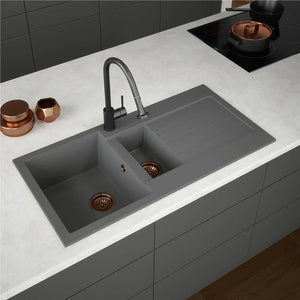Composite sinks have gained popularity in modern kitchens for their durability, aesthetic appeal, and variety of options. However, like any other kitchen fixture, they come with their own set of advantages and disadvantages. In this blog post, we’ll explore the pros and cons of composite sinks to help you make an informed decision when choosing the right sink for your kitchen.
Pros:
- Durability: Composite sinks are highly durable and resistant to scratches, stains, and heat. Made from a blend of materials like quartz, granite, and acrylic, they are built to withstand daily wear and tear in the kitchen.
- Aesthetic Appeal: Composite sinks come in a wide range of colours, styles, and finishes, making them a versatile choice for any kitchen design. Whether you prefer a sleek and modern look or a more traditional aesthetic, there’s a composite sink to suit your taste.
- Noise Reduction: Unlike stainless steel sinks, composite sinks are typically quieter when in use, thanks to their sound-absorbing properties. This can create a more peaceful and enjoyable kitchen environment, especially in open-plan spaces.
- Easy Maintenance: Composite sinks are non-porous, making them resistant to stains and bacteria buildup. They are easy to clean and maintain, requiring only a gentle wipe down with soap and water to keep them looking their best.
- Value for Money: While composite sinks may initially cost more than other materials like stainless steel, their durability and longevity make them a cost-effective investment in the long run. You won’t have to worry about replacing your sink as often, saving you money on repairs and replacements.
- Reduced carbon footprint compared to other materials: Liquida composite sinks, crafted from a pioneering blend of eco-sourced materials, offer a multitude of advantages for environmentally-conscious homeowners. With a composition comprising 30% organic materials, 40% mineral fillers, 20% long glass fibres, and 10% additives and pigments, Liquida sinks boast exceptional durability and sustainability. Notably, these sinks demonstrate a remarkable 30% to 50% reduction in CO2 emissions over their lifecycle compared to steel counterparts, making them a standout choice for eco-minded consumers.
However, it’s crucial to consider that while Liquida sinks offer unparalleled eco-value, they may come with a higher initial investment compared to traditional composite sinks. Nonetheless, for those prioritising environmental stewardship and longevity, the benefits of Liquida composite sinks far outweigh any upfront costs.
Cons:
- Weight: Although not the heaviest (granite), but in comparison to others (stainless steel) composite sinks tend to be slightly heavier than other types of sinks, which can make installation more challenging. It’s important to ensure that your kitchen cabinets and countertop can support the weight of the sink before installation.
- Susceptibility to Scratches: While composite sinks are generally durable, they can still be prone to scratching, particularly if you use abrasive cleaning tools or sharp objects directly on the surface. It’s important to take precautions to prevent scratching and maintain the appearance of your sink.
- Limited Colour Options: While composite sinks come in a variety of colours and finishes, the selection may be more limited compared to other materials like stainless steel or porcelain. If you have a specific colour scheme in mind for your kitchen, you may need to shop around to find the perfect match.
- Potential for Discolouration: Over time, composite sinks may be prone to discolouration or fading, particularly if exposed to harsh chemicals or prolonged sunlight. It’s important to follow the manufacturer’s recommendations for cleaning and maintenance to preserve the appearance of your sink.
- Price: Composite sinks can be more expensive upfront compared to other materials, which may be a drawback for budget-conscious homeowners. However, many people find that the durability and long-term benefits of composite sinks outweigh the initial cost.
In conclusion, composite sinks offer a range of benefits including durability, aesthetic appeal, and easy maintenance. However, they also come with drawbacks such as weight, susceptibility to scratches, and limited colour options. By weighing the pros and cons carefully, you can determine whether a composite sink is the right choice for your kitchen.















